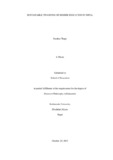
Please use this identifier to cite or link to this item:
https://hdl.handle.net/20.500.14301/222| Title: | SUSTAINABLE FINANCING OF HIGHER EDUCATION IN NEPAL |
| Authors: | Thapa, Shankar |
| Citation: | Thapa, S.(2013).Sustainable financing of higher education in Nepal. |
| Issue Date: | Oct-2013 |
| School: | SOED |
| Department: | DODE |
| Program: | PhD in Development Education |
| Abstract: | This study deals with the issue of sustainable financing of higher education in Nepal. The study has focused on intrinsic case studies of two universities, TU and KU, for assessing the financing situation of higher education in Nepal. I framed a principal research problem, ‗How has financing been in higher education of Nepal?‘ On the base of this research question, I conducted an in-depth study focusing on sustainable financing in higher education. This study reveals the higher education funding scenario particularly in relation to how the resources have been utilized in achieving the financial sustainability goal from the perspective of access, equity, and quality dimensions. I followed the qualitative research design within the horizon of interpretive paradigm based on case studies methodology. The philosophical premises encompass ontological, epistemological, axiological, and methodological assumptions in this study. The ontological assumption for this study subscribes to the notion of multiple realities regarding financing and resource utilization in higher education in the context of Nepal. My epistemological framework brings in subjective discourse which argues that knowledge can be acquired through detailed interactions with the research participants and through intensified literature reviews. However, I was fully aware of the matter that acquainting of absolute truth is not completely possible. In regard to the axiological assumption, I believe in the role of value which states human nature is a deterministic factor in research. I believe that what we uncover as ‗knowledge‘ at present will not remain as it is because of the rapidity of change in time in the field of university funding. The prolonged discourse and intensive interactions based on subjective inquiry in ii uncovering what research participants observed as real truth led me to claim that revealed knowledge is trustworthy, in spite of various limitations. I adopted the interpretive paradigm in order to extract substantive meaning from the uncovered knowledge in financing higher education. Therefore, adopting the interpretive paradigm, I derived meanings with analysis and interpretation on the comments, expression, beliefs and feelings expressed by the research participants about sustainable funding for the higher education in the present context of Nepal. I made my study more authentic by considering the concerned ideas that I assembled through literature review. In this study, I focused on different theories: human capital theory, equity theory and rate of return theory which were broadly discussed relating with the purpose of the study that offered me with a sound foundation for dealing with different research dimensions to be connected with sustainable higher education financing. A prominent finding of my study revealed the essence of five pillars as state funding, financial administration, resource management, income diversification and cost sharing. Moreover, local support, internal resource mobilization and external assistance in maintaining the financial health of higher education sounder are other findings of the study. Hence, commercialization of university products, internal resource utilization and effective financial administration are found as prerequisites for improving the financial health of higher education. |
| URI: | https://hdl.handle.net/20.500.14301/222 |
| Appears in Collections: | Theses |
Files in This Item:
| File | Description | Size | Format | |
|---|---|---|---|---|
| Shankar PhDThesis -2013.pdf | 2.92 MB | Adobe PDF |  View/Open |
Items in DSpace are protected by copyright, with all rights reserved, unless otherwise indicated.